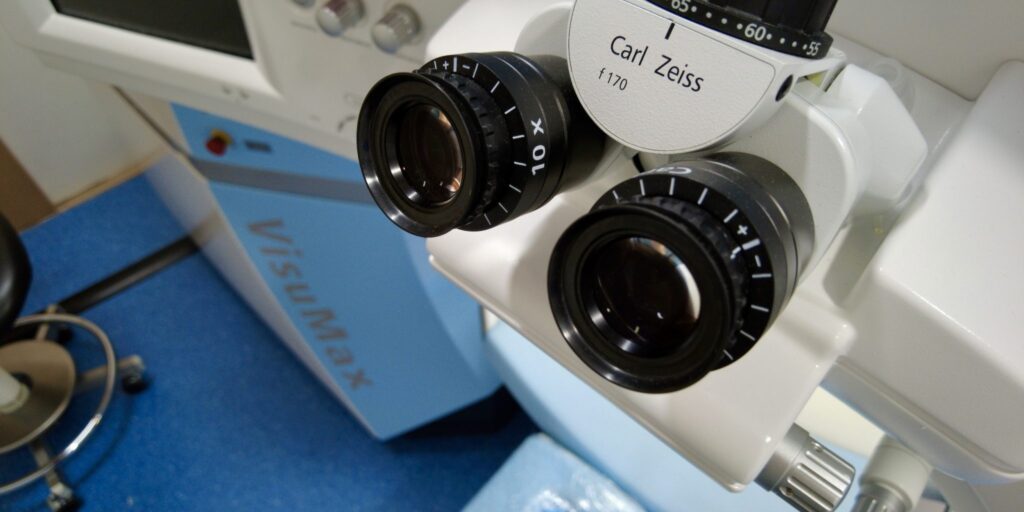In today’s fast-paced world, visual freedom is something that many individuals strive for. The ability to see clearly without the aid of glasses or contact lenses can bring a newfound sense of freedom and independence. This is where laser eye surgery comes into play, offering a transformative impact on the lives of those who undergo the procedure.
Understanding the Concept of Visual Freedom
Vision is an integral part of our daily lives, allowing us to navigate the world around us with ease. From reading and driving to enjoying the beauty of nature, our vision plays a crucial role in our overall well-being. Visual freedom, therefore, is the ability to experience the world with crystal-clear vision, unburdened by the restrictions imposed by glasses or contact lenses.
Imagine waking up in the morning and being able to see the world around you with perfect clarity, without the hassle of searching for your glasses or inserting contact lenses. Best laser eye surgery offers a permanent solution to this problem, providing individuals with the freedom to see clearly without the need for external aids.
But how does laser eye surgery work? The procedure involves using a precise laser to reshape the cornea, the transparent front part of the eye. By reshaping the cornea, the surgeon can correct common vision problems such as nearsightedness, farsightedness, and astigmatism. This innovative procedure has been proven to be safe and effective, with millions of people worldwide experiencing the life-changing benefits of visual freedom. Learn more about achieving clarity through state-of-the-art laser eye surgery techniques.

Not only does laser eye surgery eliminate the need for glasses or contact lenses, but it also allows individuals to engage in various activities without any visual limitations. Whether it’s participating in sports, swimming, or simply enjoying a rainy day without the fear of glasses getting wet, visual freedom opens up a world of possibilities.
Furthermore, the convenience of visual freedom extends beyond the physical aspect. Imagine the confidence boost that comes with being able to make eye contact with others without the barrier of glasses. Laser eye surgery can enhance not only your vision but also your self-esteem, allowing you to fully embrace social interactions and connect with others on a deeper level.
So, if you’re tired of the constant reliance on glasses or contact lenses, laser eye surgery may be the solution you’ve been searching for. Experience the freedom to see the world in all its glory, unencumbered by external aids. Consult with a qualified eye surgeon today and embark on a journey towards visual freedom.
The Evolution of Eye Surgery
Eye surgery has come a long way over the years, with traditional methods relying on invasive procedures to correct visual impairments. These methods often involved lengthy recovery periods and potential risks associated with surgery. However, with advancements in technology, laser eye surgery has revolutionized the field of ophthalmology.
Traditional Eye Surgery Methods
Before the advent of laser technology, traditional eye surgery methods, such as radial keratotomy and photorefractive keratectomy, were commonly used. These procedures involved making incisions or removing layers of tissue from the cornea to reshape it and improve vision. While effective to some extent, these methods were not without their drawbacks.
Patients undergoing traditional eye surgery often experienced discomfort, prolonged healing times, and potential side effects. The recovery process was a delicate and intricate one, requiring patients to follow strict post-operative care instructions. This included avoiding strenuous activities, wearing protective eyewear, and using medicated eye drops to prevent infection and promote healing.
Moreover, the results of traditional eye surgery were not always predictable. Factors such as individual healing responses and the surgeon’s skill level could influence the final outcome. This unpredictability made it a less desirable option for those seeking long-term visual freedom.
The Advent of Laser Technology in Eye Surgery
Laser eye surgery, also known as refractive surgery, has revolutionized the way visual impairments are treated. By utilizing laser technology, surgeons are now able to reshape the cornea with precision and accuracy, resulting in improved vision without the need for invasive procedures.
With laser eye surgery, the cornea is reshaped to correct refractive errors such as nearsightedness, farsightedness, and astigmatism. This procedure is quick, safe, and minimally invasive, offering a high degree of accuracy and predictability in achieving desired visual outcomes.
Thanks to advancements in laser technology, surgeons can now customize the treatment to each patient’s unique eye structure and visual needs. This level of customization ensures that the procedure is tailored to optimize the patient’s visual acuity and minimize the risk of complications.
Furthermore, laser eye surgery has significantly reduced recovery times compared to traditional methods. Many patients experience improved vision within hours or days after the procedure, allowing them to quickly resume their daily activities. The reduced recovery period has made laser eye surgery a more convenient option for individuals with busy lifestyles.
In addition to its effectiveness in correcting refractive errors, laser eye surgery has also paved the way for advancements in other areas of ophthalmology. The precision and versatility of laser technology have enabled surgeons to perform complex procedures such as corneal transplants and glaucoma treatment with greater success rates and fewer complications.
Overall, the evolution of eye surgery, particularly with the introduction of laser technology, has transformed the field of ophthalmology. Patients now have access to safer, more accurate, and more convenient treatment options, allowing them to achieve clearer vision and improve their quality of life.

The Science Behind Laser Eye Surgery
The laser eye surgery procedure involves several steps to ensure optimal results and patient safety.
Before delving into the details of the laser eye surgery procedure, it is important to understand the fascinating science behind this innovative technique. Laser eye surgery, also known as refractive surgery, aims to correct common vision problems such as nearsightedness, farsightedness, and astigmatism. This groundbreaking procedure utilizes the power of lasers to reshape the cornea, the clear front surface of the eye, and improve visual acuity.
The Laser Eye Surgery Procedure
During the laser eye surgery procedure, the surgeon uses a specialized laser to gently reshape the cornea. The patient’s eye is numbed using eye drops to minimize any discomfort. A protective flap is created on the outer layer of the cornea, allowing the surgeon access to the underlying tissue.
Now, let’s delve deeper into the laser technology used in this procedure. The laser employed in laser eye surgery is an excimer laser, which emits a cool, ultraviolet light beam. This unique type of laser is capable of removing tissue with extraordinary precision, allowing the surgeon to sculpt the cornea with utmost accuracy.
The laser then carefully removes microscopic amounts of tissue, reshaping the cornea to correct the specific refractive error. The flap is then repositioned, acting as a natural bandage, promoting quicker healing and reducing the risk of complications.
It is truly remarkable how this intricate process can be completed within minutes. The speed and efficiency of laser eye surgery not only offer immediate visual improvement but also allow patients to return home shortly after the procedure. This convenience is a testament to the advancements in medical technology and the expertise of skilled surgeons.
Safety and Efficacy of Laser Eye Surgery
Laser eye surgery is considered safe and effective for the majority of patients. Advances in technology have significantly reduced the risk of complications, making the procedure a viable option for those seeking visual freedom.
Prior to undergoing laser eye surgery, extensive pre-operative evaluations are conducted to determine if an individual is a suitable candidate. These evaluations take into account various factors such as age, overall eye health, and the presence of certain conditions. This meticulous screening process ensures that only those who are likely to benefit from the procedure are selected, further enhancing the safety and efficacy of laser eye surgery.
While laser eye surgery is generally safe, it is important to acknowledge that, like any surgical procedure, it carries some inherent risks. However, with proper patient selection and the expertise of skilled surgeons, these risks are minimal and can be further reduced through advancements in technology and surgical techniques.
As the field of ophthalmology continues to evolve and innovate, laser eye surgery remains at the forefront of vision correction procedures. Its ability to provide immediate visual improvement, coupled with its safety and efficacy, has transformed the lives of countless individuals, allowing them to experience the world with newfound clarity and freedom.

The Transformative Impact of Laser Eye Surgery
The benefits of laser eye surgery extend far beyond improved vision.
Immediate and Long-term Benefits of Laser Eye Surgery
One of the immediate benefits of laser eye surgery is the freedom from wearing glasses or contact lenses. Many individuals report a significant improvement in their quality of life, no longer having to worry about the inconvenience and limitations imposed by corrective eyewear.
Moreover, laser eye surgery offers long-term benefits. The results of the procedure are often permanent, allowing individuals to enjoy clear and unobstructed vision for years to come. This elimination of dependence on external aids can foster a sense of independence and confidence in one’s abilities.
The Psychological Impact of Improved Vision
The transformative impact of laser eye surgery extends beyond the physical realm and reaches deep into the psychological well-being of individuals. The newfound visual freedom can enhance one’s self-esteem, allowing them to feel more comfortable and at ease in social situations.
Additionally, improved vision can open up a world of opportunities. It can improve performance in various aspects of life, such as education, career, and hobbies. The ability to see clearly without hindrance can boost productivity and allow individuals to fully engage in their chosen pursuits.
Debunking Common Myths About Laser Eye Surgery
Despite the numerous benefits and advancements in the field, laser eye surgery is often surrounded by misconceptions and fears.
Addressing Fears and Misconceptions
One common misconception is that laser eye surgery is a painful and risky procedure. However, advancements in anesthesia and surgical techniques have made the procedure virtually painless. Patients may experience some mild discomfort or temporary dryness after the surgery, but this can be easily managed with prescribed medications and lubricating eye drops.
Another fear revolves around the recovery process. Contrary to popular belief, the recovery following laser eye surgery is generally quick and relatively pain-free. Most patients are able to resume their normal activities within a few days, with minimal downtime required.
The Reality of Laser Eye Surgery Recovery
Recovery from laser eye surgery is a gradual process. In the initial days following the procedure, it is normal to experience some sensitivity to light and mild dryness or irritation. These symptoms can be alleviated through the use of prescribed medications and regular application of lubricating eye drops.
It is crucial to follow the post-operative instructions provided by the surgeon to ensure a smooth recovery. Attend follow-up appointments as advised to monitor progress and address any concerns that may arise. With proper care and adherence to the recovery guidelines, the majority of patients experience a successful and uneventful recovery.
In conclusion, laser eye surgery has redefined the concept of visual freedom. With its ability to correct refractive errors and enhance vision, this procedure has the power to transform the lives of those seeking clear and unobstructed vision. By understanding the science behind laser eye surgery, debunking common myths, and embracing the immediate and long-term benefits, individuals can make informed decisions about their visual health and embark on a journey towards visual freedom.
